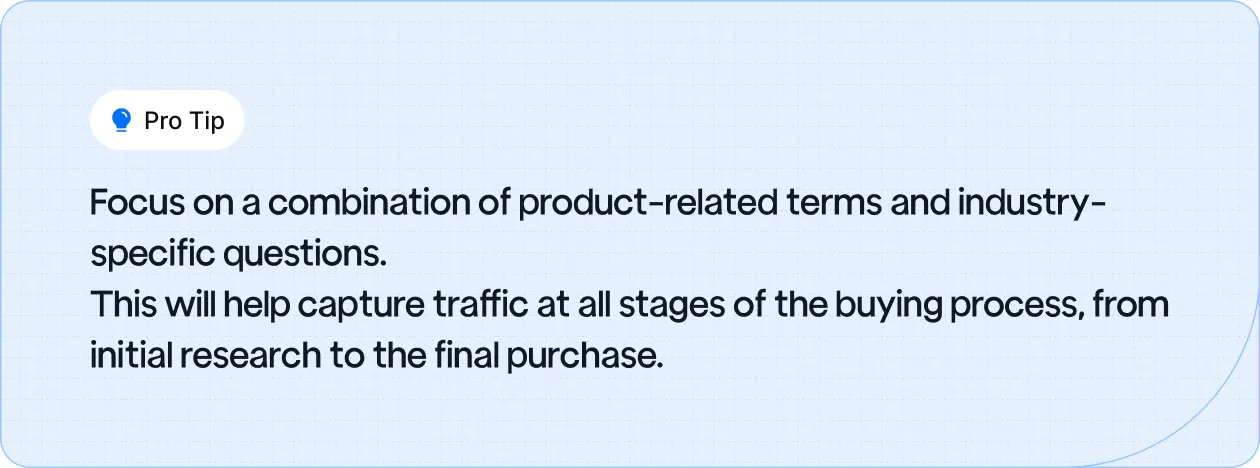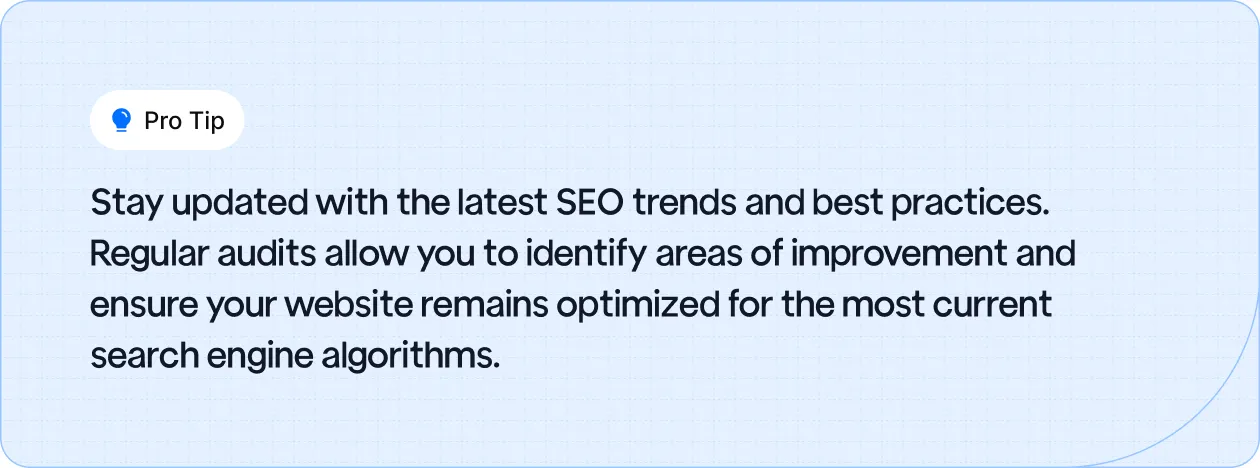Are you struggling to attract the right leads for your distribution business?
Many distributors use digital marketing to reach potential customers, but turning that traffic into qualified leads requires a strong SEO strategy. Your website needs to be SEO optimized, or you're missing out on reaching customers who are actively searching for the products you offer.
Your competitors are already capturing those leads by ranking higher on search engines.

This guide will show you how to improve your SEO strategy, attract the right customers, and turn that traffic into real business opportunities.
What is SEO for Distributors?
SEO, or Search Engine Optimization, for distributors is the process of optimizing your website so that it ranks higher on search engines when potential customers search for products you distribute.
SEO ensures your website appears when customers search for products you sell, allowing you to reach those looking for exactly what you offer.
Why Do You Need It Now?
Increased Visibility:
- The Problem: Most people only click on the first page of Google search results. Your potential customers may never find you if you are not visible online.
- The Solution: SEO helps your website rank on the first page of search results, so more people see your business.
Long-Term ROI:
- The Numbers: Organic SEO leads convert at a 14.6% rate, twice as high as paid ads.
- The Advantage: SEO provides long-term results with more qualified leads that cost less in the long run than ads.
Competitor Insight:
- The Reality: If your competitors are using SEO and you’re not, they’re capturing your leads.
- The Solution: Implementing a strong SEO strategy allows you to level the playing field and win over those leads.
SEO Strategies To Help Scale Your Distribution Business: Step-by-Step Guide
SEO is a powerful tool for distributors looking to boost visibility and attract the right customers. Below are simple, effective strategies that can help scale your distribution business.
Step 1. Start with a Simple Website Check-Up
Your website is the foundation of your online presence. If it’s not working properly, it won’t matter how much traffic you're driving; it won't convert into business. The first step to optimizing your website for SEO is to make sure it's technically sound, fast, and easy for both users and search engines to navigate.
Actionable Steps:
- Mobile-Friendly Design: More than half of internet users access websites via mobile devices, so your site must be optimized for mobile. Google also uses mobile-first indexing, meaning it prioritizes the mobile version of your site for ranking.
- Fast Loading Speed: If your site takes too long to load, visitors will leave before they even get a chance to engage. Tools like Google PageSpeed Insights can help you assess your website's speed and suggest improvements.
- Technical Soundness: Ensure that your website is free from technical issues like broken links, faulty redirects, or missing metadata. These issues can confuse search engines and negatively affect your ranking.
Tools:
- Google PageSpeed Insights: This tool evaluates your site’s speed and gives suggestions for improvement.
- SEMrush: Provides an in-depth website audit to identify technical problems, such as slow pages, broken links, and other SEO issues.
Step 2. Find the Right Searches Your Customers are Typing on Google
Knowing the right keywords to target is crucial. Keywords are the phrases potential customers type into search engines when looking for products you distribute. Finding the right keywords allows you to optimize your site and attract qualified leads.
What to Do?
Research long-tail keywords (i.e., phrases with 3 or more words) that are relevant to your products. For example, instead of just “electrical parts,” try something more specific like “wholesale electrical parts near me.”
These long-tail keywords have lower competition and are more likely to lead to conversions.
Tools: Ahrefs, Google Keyword Planner, SEMrush: These tools help you find high-ranking keywords related to your business and check the competition for those keywords.

Step 3. Create Useful Content for Your Customers
Content is the backbone of SEO. Your content should provide real value to your potential customers. Create informative content that solves problems, educates, and answers questions relevant to your industry.
Content Ideas:
- Product Guides: Help your customers make informed decisions by providing in-depth guides about your products.
- Industry Reports: Share valuable insights and data related to the distribution industry to position yourself as a trusted resource.
- Case Studies: Showcase success stories that demonstrate the value your products bring to customers.
- Customer Testimonials: Positive reviews from past customers can build trust with new leads.
Example: If you’re an electrical distributor, a guide on “Choosing the Right Wiring for Your Commercial Projects” can position you as a go-to expert, helping potential customers make informed purchasing decisions.
Step 4. Make Your Website Easy to Find
Your website needs to be easy for search engines to find and index. Search engines use meta tags, headers, and images to understand what your website is about and how relevant it is to a search query.
- Meta Tags: Ensure your title tags and meta descriptions include relevant keywords. These appear in search results and should provide a clear idea of what each page is about
- Image Optimization: Optimize your images by using alt text (descriptive text for images) that includes your target keywords. Compress your images to ensure they load quickly.

Step 5. Build Authority with Quality Backlinks
Backlinks are links from other websites that point to yours. Search engines view these links as a signal of trust and authority, which can help improve your website’s ranking.
Actionable Steps:
- Industry Partnerships: Reach out to other businesses or industry-related websites for backlinks.
- Guest Posts: Write guest blog posts on reputable websites within your industry and include links to your site.
- Business Directories: Ensure your business is listed in reputable industry directories.
Step 6. Get Noticed Locally
For distributors with physical locations, local SEO is essential. It helps you appear in search results when people are looking for businesses in your area.
- Google My Business: Make sure your business is listed on Google My Business with accurate information (NAP, Name, Address, Phone Number). This improves your visibility in local searches.
- Local Keywords: Include location-based keywords on your product and content pages. For example, “distributors of HVAC equipment in [City].”

Step 7. Fix Technical Issues on Your Website
A technically sound website is critical for SEO. Slow websites, mobile-unfriendly pages, or websites that are hard for Google to crawl can all hurt your rankings.
Actionable Steps:
- Page Speed: Make sure your website loads quickly. Users leave if it takes too long.
- Mobile-Friendliness: Ensure your site works well on mobile devices, especially since more people browse on smartphones.
- Google Crawling: Make sure Google can easily crawl and index your site’s pages.
Tools: Google Search Console helps identify issues on your site.
Step 8. Turn Visitors into Customers
Driving traffic to your website is only half the battle. You need to convert that traffic into leads and sales.
Improve User Experience: Make sure your website is easy to navigate, and that visitors can easily find the information they need.

Measuring Your SEO Success: Key Metrics for Distributors
Tracking the right metrics is essential for understanding how well your SEO efforts are paying off. By closely monitoring the right indicators, you can make data-driven decisions to further optimize your site and improve results.
Traffic:
- Organic traffic refers to visitors who find your website through unpaid search results. Tracking this metric helps you understand how many people are discovering your site through search engines.
- Tools: Google Analytics is a powerful tool that allows you to track organic traffic, identify which pages attract the most visitors, and gain insight into visitor behavior.
Rankings:
- Monitoring your keyword rankings helps you track your progress and see where you stand in search engine results for important terms. If you notice certain keywords slipping, it's an indicator that you need to adjust your strategy.
- Tools: Tools like SEMrush or Ahrefs allow you to track keyword positions and get insights on where you can improve to push higher in the rankings.
Leads and Conversions:
- SEO is about converting that traffic into leads and customers. Tracking how many visitors take action, such as filling out a form or making a purchase, is key to understanding the effectiveness of your site.
- What to Do: Monitor conversion rates from organic traffic. This helps you measure how well your SEO efforts are turning visitors into business opportunities.
Common SEO Mistakes Distributors Make (And How to Avoid Them)
Even with the best SEO strategies in place, some common mistakes can still hold your website back from reaching its full potential. Here’s what to look out for and how to avoid them.
- Ignoring Mobile Users: With 64.35% of internet traffic coming from mobile devices, your website must work seamlessly on smartphones and tablets.
Potential customers may leave before engaging with your content or making a purchase if your site is not mobile-friendly.
- Neglecting Technical SEO: A slow website, poor navigation, or incorrect technical setup can negatively impact your rankings. Search engines prioritize websites that load quickly and are easy to navigate.
A website that is hard to crawl or has technical issues will hurt your SEO performance.
Regular Audits and Updates: SEO is an ongoing process. Regularly auditing your website and adjusting your strategy is essential to staying ahead of the competition and maintaining strong rankings.

Elevate Your Distributor Business with SEO
A robust SEO strategy is a necessity. You need to be visible when your customers search, or you are losing out on valuable opportunities.
Implementing the right tactics can help your business rank higher, attract qualified leads, and drive sustainable growth.
FAQs
Q1. What is SEO, and why is it important for distributors?
A1. SEO (Search Engine Optimization) helps distributors optimize their websites to rank higher in search engine results, making it easier for customers to find their products. This is crucial because it increases visibility, attracts qualified leads, and ultimately boosts sales.
Q2. How long does it take to see results from SEO efforts?
A2. SEO is a long-term strategy, and it usually takes 3 to 6 months to see significant results in search rankings and traffic, depending on factors like competition and website age.
Q3. What are the key components of an effective SEO strategy for distributors?
A3. Key components include keyword research, on-page optimization (meta tags, headers), technical SEO (site speed and mobile-friendliness), content creation, and building quality backlinks from reputable sites.
Q4. How can local SEO benefit my distribution business?
A4. Local SEO helps you appear in local search results, attracting nearby customers who are searching for products you sell. Optimizing your Google Business Profile and using location-specific keywords can drive more local leads and traffic to your physical location.
Q5. What are common SEO mistakes distributors should avoid?
A5. Common mistakes include ignoring mobile users, neglecting technical SEO (slow websites, poor structure), not optimizing for local SEO, and failing to measure SEO success using key metrics like traffic, rankings, and conversions.
Q6. Do I need an SEO expert, or can I handle it myself?
A6. While some SEO tasks can be managed in-house, hiring an SEO expert can provide a more comprehensive strategy, especially for technical SEO and link-building, leading to better long-term results.
Q7. How do I measure the success of my SEO efforts?
A7. Success can be measured by tracking organic traffic, keyword rankings, and conversion rates. Tools like Google Analytics and Google Search Console help monitor these metrics to assess the effectiveness of your SEO strategy.





















.webp)








.webp)
.svg)


.svg)
.svg)
.svg)




.svg)


